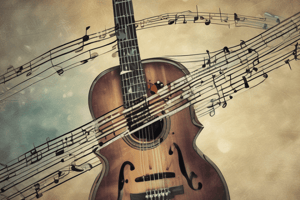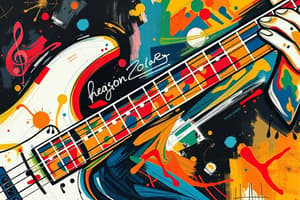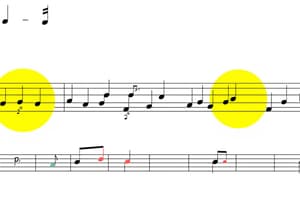Podcast
Questions and Answers
What musical change occurs when transitioning from e flat to b flat?
What musical change occurs when transitioning from e flat to b flat?
- The rhythm slows down
- The sound brightens up (correct)
- The sound becomes quieter
- The melody becomes more complex
Which chord tone is suggested to be released when returning to the one chord?
Which chord tone is suggested to be released when returning to the one chord?
- The 5th
- The root (correct)
- The 2nd
- The 7th
Which ensemble setup is mentioned as being suitable for the song?
Which ensemble setup is mentioned as being suitable for the song?
- Small group with a strong baseline (correct)
- Large orchestra arrangement
- A capella vocal group
- Solo performance with piano
What specifically enhances the one chord in the context described?
What specifically enhances the one chord in the context described?
What characteristics were attributed to the twist on the 3 chord?
What characteristics were attributed to the twist on the 3 chord?
What is the primary chord progression used in the piece discussed?
What is the primary chord progression used in the piece discussed?
Which chord is identified as the 'four' chord in the key of E flat?
Which chord is identified as the 'four' chord in the key of E flat?
What type of suspensions does the artist frequently play with on the one chord?
What type of suspensions does the artist frequently play with on the one chord?
What note progression is suggested for playing pentatonically with Ben Morrison?
What note progression is suggested for playing pentatonically with Ben Morrison?
What is the characteristic rhythmic pattern frequently mentioned in the piece?
What is the characteristic rhythmic pattern frequently mentioned in the piece?
How is the dominant 7 chord introduced in the discussion?
How is the dominant 7 chord introduced in the discussion?
Which specific chord is referred to as the sharp 4 in the key of E flat?
Which specific chord is referred to as the sharp 4 in the key of E flat?
What aspect of the guitar melody is noted for its distinctive quality?
What aspect of the guitar melody is noted for its distinctive quality?
Flashcards are hidden until you start studying
Study Notes
Into the Mystic Key and Chord Progression
- The song is in the key of E flat major.
- The main chord progression consists of two chords: E flat major (I chord) and B flat major (V chord).
- The song primarily utilizes a consistent bass pattern that alternates between the I and V chord, creating a distinct swing feel.
Bass Pattern Variations and Suspensions
- Different variations occur when transitioning back to the I chord.
- Some variations include moving through the scale degrees 3, 2, 1, or directly from 5 to 1.
- Other variations involve playing specific notes between the I and V chord, creating a rhythmic feel.
- The I chord incorporates suspensions, specifically sus2 and sus4, adding complexity and a melodic feel.
Bridge Section and Pentatonic Scale
- The bridge section utilizes the pentatonic scale, specifically the notes: 1, 2, 3, 5, and 6.
- The pentatonic scale creates a distinctive melodic feel that aligns well with the song's overall sound.
Melody, Chromatic Runs, and Unique Chord Changes
- The melody features chromatic runs, often mirroring the piano's runs.
- The song features a unique twist in the bridge section, where the G minor chord (III chord) is played with a C# in the melody.
- This C# is actually the sharp 4 in the key of E flat.
- This unexpected note adds a unique melodic quality and can be perceived as transitioning into a B flat landscape, emphasizing the contrast within the song's structure.
Final Chord Resolution
- The final chord resolution of the song is on the I chord (E flat major).
- The resolution typically occurs on either the third or the root of the chord.
Arrangement Considerations
- The song's foundation lies in the bass line; it's crucial for maintaining the song's feel.
- The song might be best suited for an ensemble or small group, allowing for dedicated instruments to handle the bass line and chords.
Musical Considerations
- The song features two distinct swing patterns for the bass.
- The use of suspensions on the I chord, the unique sharp 4 on the III chord in the melody, and the consistent bass patterns are key elements that contribute to the song's unique character.
Studying That Suits You
Use AI to generate personalized quizzes and flashcards to suit your learning preferences.




